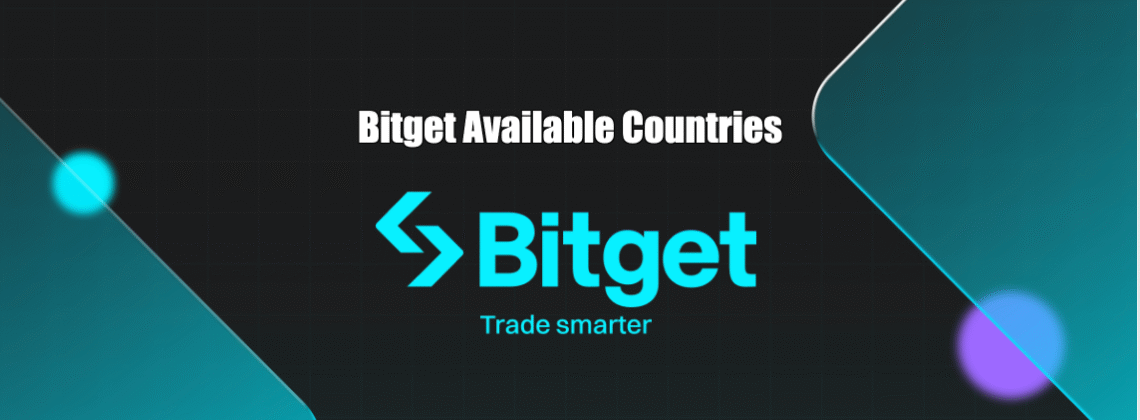
Bitget is among the top and reliable cryptocurrency exchange and Web3 company that was introduced the year 2018 and has be working since then without a problem. Based on my research before writing this article, the platform allows you to buy, sell, as well as trade crypto – copy elite traders – earn interest on assets – and make use of on‑ramp/off‑ramp services that are offered through partners. Bitget publishes its Proof of Reserves (PoR) each single month in order to show it holds at least as much crypto as the pplatform users deposit. Bitget reported a 199% total reserve ratio, which was well above the 100% minimum in June 2025. The platform also run a Protection Fund that started at US\$300M in order to help them cover extreme events.
If you are planning to make use of Bitget but does not know if the platform is available for users from your countries, you have come to the right post. In this article, we shall explore all the Bitget available countries and also reveal how the platform works and other alternatives in case your country is not supported.
I found out that Bitget is kind of working closely with regulators – and has a growing list of registrations/approvals (for example AUSTRAC in Australia, OAM in Italy, VASP registrations in Bulgaria, Lithuania, Poland, a DASP/BSP setup in El Salvador – approval to communicate financial promotions in the UK via an Authorized Person, and approval in Georgia’s Tbilisi Free Zone). Exact scope varies by country and product.
How The Bitget Works Based On My Research
- Register & verify (KYC)
You will need to create an account and then complete identity verification. The user has to be 18+ before registering, and can only verify one account. If Bitget does not supported your country, the system is not going to allow you to complete the KYC. - Deposit Fund
“Fiat” services such as bank transfers, card payments, etc. are being offered by third‑party providers, not by Bitget itself. And the availability all depends on the country you reside as well as the partner’s coverage. - Trade
Users can be able to trade spot (regular buying/selling) and – in many places, futures. But understand that some regions ban crypto derivatives for retail users (country such as the UK for example), so users may only see spot and other features there. - Withdraw Money
Send crypto out, or make use of the same third‑party fiat rails (where available) to cash out. Limits depend on your KYC level and local rules.
BitGet Available Countries
BitGet Supported some many countries around the world. Unfortunately there are some popular countries that the platform does not accept. Here is a breakdown of BitGet available countries:
- Liberia
- Saint Lucia
- Liechtenstein
- Sri Lanka
- Lesotho
- Lithuania
- Luxembourg
- Latvia
- Macau
- Morocco
- Moldova
- Madagascar
- Maldives
- Mexico
- Marshal Islands
- Macedonia
- Mali
- Malta
- Myanmar
- Montenegro
- Mongolia
- Mozambique
- Mauritius
- Islamic Republic of Mauritania
- Malawi
- Malaysia
- Namibia
- Niger
- Nigeria
- Nicaragua
- Niue
- Norway
- Nepal
- Nauru
- New Zealand
- Oman
- Pakistan
- Panama
- Peru
- Philippines
- Palau
- New Guinea
- Poland
- Portugal
- Paraguay
- Palestine
- Qatar
- Kosovo
- Romania
- Russia
- Rwanda
- Saudi Arabia
- Senegal
- Solomon Islands
- Sierra Leone
- El Salvador
- San Marino
- Serbia
- Sao Tome and Principe
- Suriname
- Slovakia
- Slovenia
- Sweden
- Eswatini
- Seychelles
- Syria
- Turks and Caicos Islands
- Chad
- Togo
- Thailand
- Tajikistan
- Turkmenistan
- Timor-Lester
- Tonga
- Trinidad and Tobago
- Tunisia
- Turkey
- Tuvalu
- Taiwan
- Tanzania
- Uganda
- Ukraine
- Uruguay
- Uzbekistan
- Vatican City State
- Saint Vincent and the Grenadines
- British Virgin Islands
- Vietnam
- Vanuatu
- Samoa
- Kosovo
- South Africa
- Zambia
Bitget Restricted countries
Bitget publicly lists where it does not operate. If your location is not on the “Prohibited Countries and Regions” list, you’re usually in a Bitget accepted country (though some products may still be restricted in your coountry). Make sure that you always check the latest Terms and Conditions before you join since this list can change. Below is the list of Bitget restricted countries:
- Central African Republic
- Cuba
- United kingdom
- Hong Kong
- Iran
- Netherlands
- Republic of Korea
- Sudan
- Singapore
- South Sudan
- USA
- Canada
- Canada (Alberta)
- Crimea, Donetsk, Luhansk (Ukraine regions under sanctions)
- United States (including Puerto Rico, Guam, U.S. Virgin Islands, American Samoa, Northern Mariana Islands, and the U.S. Minor Outlying Islands: Baker Island, Howland Island, Jarvis Island, Johnston Atoll, Kingman Reef, Midway Islands, Navassa Island, Palmyra Atoll, Wake Island)
- Iraq
- Libya
- Yemen
- Afghanistan
- Democratic Republic of the Congo
- Guinea‑Bissau
- Somalia
- South Sudan
- Haiti, Lebanon
(Official “Prohibited Countries” list as of July 25, 2025)
Bitget’s compliance page repeats this list and points you back to the Terms for updates. If you travel into a prohibited region, access can be blocked.
New in 2025: Bitget removed Syria from the restricted list on June 12, 2025. Syrian residents can register and complete KYC again.
What it means in practice
- If your country is not above, it’s generally an accepted/supported country for creating a Bitget account. Product access (like futures) still depends on local rules.
- Example: The UK isn’t on the blocked list, but the FCA still bans crypto derivatives for retail investors, so you’ll typically have spot but not futures.
- Alberta (Canada) is explicitly restricted, and the Alberta Securities Commission has warned that the entity “Canada Bitget Limited” isn’t registered there. If you live in Alberta, you can’t use Bitget.
Countries with extra support (bank deposits)
If you want to fund by bank transfer, Bitget lists specific countries where bank deposits are supported (this is a subset of all supported countries). As of February 20, 2025, the supported fiat/country pairs include:
- EUR: Germany, France, Spain, Italy, Netherlands, Belgium, Portugal, Ireland, Austria, Finland, Greece, Estonia, Latvia, Lithuania, Slovakia, Slovenia, Malta, Cyprus (specific areas), Andorra
- BRL: Brazil
- RUB: Russia
- PLN: Poland
- CZK: Czech Republic
- DKK: Denmark, Greenland, Faroe Islands
- AUD: Australia
- CAD: Canada
- NOK: Norway
- SEK: Sweden
- CHF: Switzerland
- HUF: Hungary
- ZAR: South Africa
- VND: Vietnam
This list is only for bank rails; you may still be able to deposit via card, third‑party gateways, or P2P in other supported countries.
Also remember: fiat rails are run by third‑party providers, so availability can differ from the core exchange.
Regional notes you should know
- United States: Bitget does not operate in the U.S. at all; even U.S. territories are blocked.
- United Kingdom: You can use Bitget for spot trading and other non‑derivatives features, but retail crypto derivatives remain banned by the FCA.
- Hong Kong & Singapore: Both are on Bitget’s prohibited list for the global platform due to local licensing requirements.
- Syria: Newly supported again as of June 12, 2025.
- Alberta (Canada): Not supported (see ASC investor caution). Other Canadian provinces may have partial access, but check your local rules and KYC flow.
- Traveling? If you visit a prohibited region, Bitget may block your access while you’re there. That’s in the Terms.
Safety & transparency (quick peek)
- Proof of Reserves: Public, monthly, with a reserve ratio above 100% (199% in June 2025; July updates regularly published). You can verify balances via a Merkle tree tool.
- Protection Fund: Bitget says it maintains \$300M+ to protect users; recent reports show the fund value has been well above the baseline. (Bitget)
- Compliance footprint: Registrations/approvals in multiple jurisdictions (AU, IT, PL, LT, BG, CZ, EL Salvador, UK promos, Georgia TFZ, Argentina), with more applications in progress. This helps keep access open across Bitget supported countries.
FAQ
1) How do I know if my country is supported?
Check the Prohibited Countries in the Terms. If you’re not on that list, you’re generally in the Bitget accepted countries. You can also start KYC to confirm—your country will appear in the drop‑down only if supported.
2) Why can’t I see futures?
Some places (like the UK) ban retail crypto derivatives, so Bitget hides that product for those users. Spot trading may still be available.
3) Is bank transfer available everywhere?
No. Bank deposits are only supported in certain countries/currencies (see list above). Card, P2P, or third‑party gateways can still work where bank rails don’t.
4) Do rules change?
Yes, and sometimes quickly. For example, Syria moved from “restricted” to “supported” on June 12, 2025. Always re‑check the Terms.


